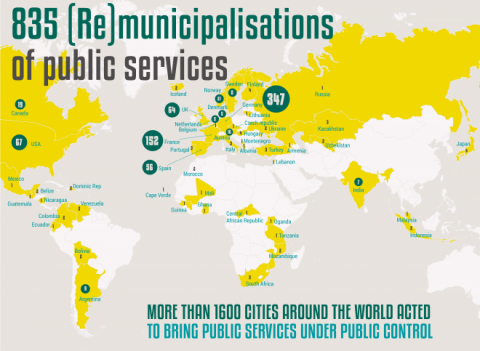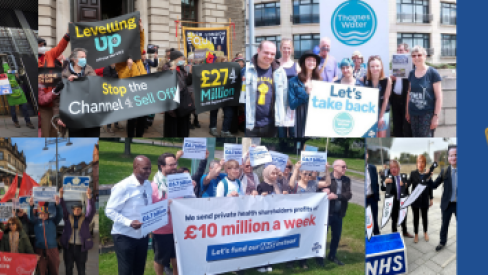
23 June 2017
New research reveals 835 examples of new public ownership across the globe to inspire us here in the UK!
‘Reclaiming Public Services’ is an in-depth world tour of new initiatives in public ownership and the variety of approaches to deprivatisation. It’s vital reading if you’re interested in the future of local, democratic services like energy, water and health care.
From New Delhi to Barcelona, from Argentina to Germany, thousands of politicians, public officials, workers, unions and social movements are reclaiming or creating public services to address people’s basic needs and respond to environmental challenges. They do this most often at the local level.
The new research from the Transnational Institute has been co-published with organisations around the world, including We Own It. It shows that there have been at least 835 examples of (re)municipalisation of public services worldwide since 2000, involving more than 1,600 municipalities in 45 countries.
Why are people around the world reclaiming essential services from private operators? There are many motivations: to end private sector abuse; regain control over the local economy; give people affordable services; or deliver ambitious climate strategies.
Remunicipalisation is taking place in small towns and in capital cities, following different models of public ownership and with various levels of involvement by citizens and workers. Nevertheless, a coherent picture is emerging: it is possible to build efficient, democratic and affordable public services. We can say no to ever declining service quality and ever increasing prices. More and more people and cities are closing the chapter on privatisation, and putting essential services back into public hands.
Messages from Vienna, Barcelona and Paris
Ulli Sima, Vienna City Councilor for the Environment and Wiener Stadtwerke: “As early as 2001, Vienna protected drinking water with a constitutional decision. Municipal services must remain public and should not be sacrificed to private profit. We want to ally with other cities for strong municipal services."
Eloi Badia, the Barcelona Councillor for presidency, water and energy: “It is important to demystify the process of privatisation that has been launched in recent years by several governments, because it's a model that has not proved its efficiency, failing to offer a better service or a better price.”
Célia Blauel, President of Eau de Paris and Deputy Mayor of Paris in charge of the environment, sustainable development, water and the energy-climate plan: “Bringing local public services under public control is a major democratic issue, especially for such essential services as energy or water. It means greater transparency and better citizen supervision. In the context of climate change, it can contribute to leading our cities toward energy efficiency, the development of renewables, the conservation of our natural resources, and the right to water.”
Key findings of the book
- There are better solutions than privatisation
- Remunicipalisation is far more common than presumed, and it works
- Remunicipalisation is a local response to austerity
- Remunicipalisation is a key strategy for energy transition and energy democracy
- Bringing services back in-house is ultimately cheaper for local authorities
- Remunicipalisation drives better, more democratic public services
- Remunicipalisation presents 835 more reasons to fight trade and investment deals
- Lessons learned: Don’t privatise in the first place
- Remunicipalisation provides opportunities for new, diversified, democratic public ownership
- Remunicipalising cities and citizens groups are working together and building networks
The book is published by Transnational Institute (TNI), Multinationals Observatory, Austrian Federal Chamber of Labour (AK), European Federation of Public Service Unions (EPSU), Ingeniería Sin Fronteras Cataluña (ISF), Public Services International (PSI), Public Services International Research Unit (PSIRU), We Own It, Norwegian Union for Municipal and General Employees (Fagforbundet), Municipal Services Project (MSP) and Canadian Union of Public Employees (CUPE).











Comments
John Howe replied on Permalink
Privatisation of public utilities has failed, in the UK it is easy to pick out transport services of rail and bus as being no more efficient than public ownership, indeed Britain's railways grasp larger and larger amounts of public money than when in public ownership and the bus services like rail, are operated not as public services but as profit centres where profit is king.
Britain's railways of course, are still in public ownership but by French, German and Spanish railways. It is a disgrace.
George Talbot replied on Permalink
A very impressive and encouraging report!
Having long criticised the NHS’s use of the purchaser/provider split*, I welcome a letter from Nigel Hamilton blaming an almost religious adherence to it by the public services for threatening those using services†. I quote his pertinent comparison of services contracted out by Councils with those provided by an in-house team.
“I know... as a senior local government housing officer that there was a time when a major technical project, like the refurbishment of a tower block, would have been led by an in-house team including architects, engineers and other experts whose professional pride, ability to sleep at night and pension depended on getting it right.
“These days such a project will usually be led by a commissioning team, (who) are heavily dependent on the assurances, goodwill and technical competence of the provider organisations, whose staff are under huge pressure to put in a bid that minimises costs to win the contract and maximise the financial return from running it.”
* See An open letter to the Royal College Presidents regarding the Health and Social Care Bill, NHSCA, 9 Sep 11: http://www.hospitaldr.co.uk/blogs/features/open-letter-to-royal-college-presidents-on-health-bill
† See How might we avert another tragedy like the Grenfell Tower fire?, Guardian Letters, 16 Jun: https://www.theguardian.com/uk-news/2017/jun/15/how-might-we-avert-another-tragedy-like-the-grenfell-tower-fire
Add new comment